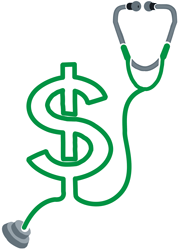This time of year always prompts discussion regarding the subject of transition. As I visit emergency departments and medical groups throughout the country, there are three topics about which I consistently receive questions.
Inquiring minds seem to want to know:
- How to evaluate and purchase appropriate disability insurance
- How to plan for retirement now and in the future
- How to allocate increased income
I hope that the following summary provides you with confidence, education, and awareness as you make decisions for yourself and your families.
Disability insurance for emergency residents
There are plenty of good opportunities for disability insurance in today's marketplace; however, misinformation is abundant. The bottom line is that in the field of emergency medicine there are six very competitive contracts in most states. The competitive features to understand are:
Own occupation definition of disability – Each of these contracts will consider you totally disabled if you cannot perform the substantial and material duties of your occupation, regardless of outside income or earnings. Understand that although disability claims are unique situations, they are handled in a similar way by every company. All companies want to pay as much as an insured is eligible for, but certainly not more than is reasonable. An own occupation contract does not guarantee that you will receive full benefits in every situation, but it does offer the most comprehensive, flexible level of income protection in the most diverse set of potential claim scenarios.
Benefit limits – This is where current residents really benefit. Currently, a resident or fellow within the last six months of training can obtain up to $7,500 of tax-free monthly income protection. Obtain this prior to completing training and you may be able to start in practice with greater than 100% of your net income insured. This is well above the normal industry guidelines, but the opportunity expires as soon as you complete your training.
Out-of-pocket cost – Price is always an issue, of course, but the relative benefit cost is as low as it has been in 14 years. For the most significant price reductions, obtain disability as a group of at least three people. Males can save 10-12%, and females can save 45%!
A competent disability advisor will be able to compare multiple contracts, design an appropriate strategy, and negotiate the terms of the contract(s) if there are any medical complications. For more detailed information on this topic, review the disability filter video, located at: http:\\www.integratedwealthcare.com/physician-strategies/emra-members.
Retirement planning
After years of minimal income and delayed gratification, the transition into practice offers the opportunity to finally make up for lost ground. There are three things to understand about retirement planning:
Set a goal – You need some understanding of what you want to accomplish, and when. This will validate the amount of ongoing retirement contributions, as well as guide the investment structure.
Invest appropriately – Try to achieve maximum growth with minimal risk. This can be a complex topic, so if you are not comfortable making your own investment decisions, pay someone for their expertise.
Reduce income taxes – As income goes up, so does your relative tax bracket. Look for 403(b), 401(k), 457 and SEP IRA plans to allow for significant tax reduction. If you are self-employed, the SEP IRA or solo 401(k) allow for very high pre-tax contributions.
Allocating income
Whether you are juggling a house-staff salary or looking to allocate a higher level of practice income, take some time to create a budget. For quantifiable objectives, such as a home down payment, vacations, and emergency savings, create a separate account at your bank for each goal and contribute a fixed monthly amount via bank draft. For retirement, education for children, debt repayment, and other larger items, develop an end goal and make contributions that are in line with those objectives.
Having a well-planned budget will allow you to maximize available income, minimize income taxes, and maintain confidence in your personal financial situation.



